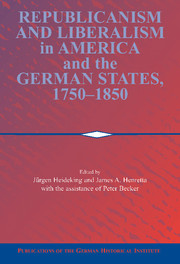Book contents
- Frontmatter
- Introduction
- PART I OVERVIEW
- PART II THE REPUBLICAN WORLD
- PART III THE TRANSITION FROM REPUBLICANISM TO LIBERALISM
- PART IV THE LOGIC OF LIBERALISM
- 13 “The Right to Possess All the Faculties that God Has Given”: Possessive Individualism, Slave Women, and Abolitionist Thought
- 14 Freedom of Contract and Freedom of Person: A Brief History of “Involuntary Servitude” in American Fundamental Law
- Index
13 - “The Right to Possess All the Faculties that God Has Given”: Possessive Individualism, Slave Women, and Abolitionist Thought
Published online by Cambridge University Press: 05 January 2013
- Frontmatter
- Introduction
- PART I OVERVIEW
- PART II THE REPUBLICAN WORLD
- PART III THE TRANSITION FROM REPUBLICANISM TO LIBERALISM
- PART IV THE LOGIC OF LIBERALISM
- 13 “The Right to Possess All the Faculties that God Has Given”: Possessive Individualism, Slave Women, and Abolitionist Thought
- 14 Freedom of Contract and Freedom of Person: A Brief History of “Involuntary Servitude” in American Fundamental Law
- Index
Summary
The problem of possessive individualism haunts the study of American slavery and emancipation. It lies at the heart of the ambiguities of antislavery reform, distilling the moral questions involved in the transition from chattel slavery to free-market relations which was envisioned by abolitionists. It marks the limits of an ideal of freedom defined by the negation of property in the persons of others. It lies as well at the heart of the perplexities of liberalism as a theory of women's emancipation, distilling the contradiction between affirmations of universal human rights and assumptions of sexual inequality based on immutable physical difference.
This chapter reconsiders antislavery ideas of possessive individualism in light of the circumstances of enslaved and freedwomen. It explores diverging notions of the relationship between theories of sex difference and theories of emancipation rooted in rights of proprietorship, foremost among them the right of self-ownership. My interpretation centers on antislavery rhetoric of the body. It focuses particularly on the complex ideological consequences of the use by abolitionists of the symbol of the suffering female slave to condemn self-dispossession. I argue that this symbolism - as it was handled by black, female antislavery thinkers - worked to disrupt rather than to validate the conventional categories of sex difference customarily associated with liberal beliefs. This chapter also addresses the rights consciousness of freedwomen; I argue that the right of self-ownership was of no small importance. The glaring ideological limits, evasions, and contradictions of possessive individualism as an antislavery theory have been well plumbed by historians.2 But very little is known about how that theory figured in the aspirations to freedom of black women. Exploring this body of thought casts new light not only on constructions of liberalism but on the meaning of freedom in the ages of slavery and of emancipation.
- Type
- Chapter
- Information
- Publisher: Cambridge University PressPrint publication year: 2002



